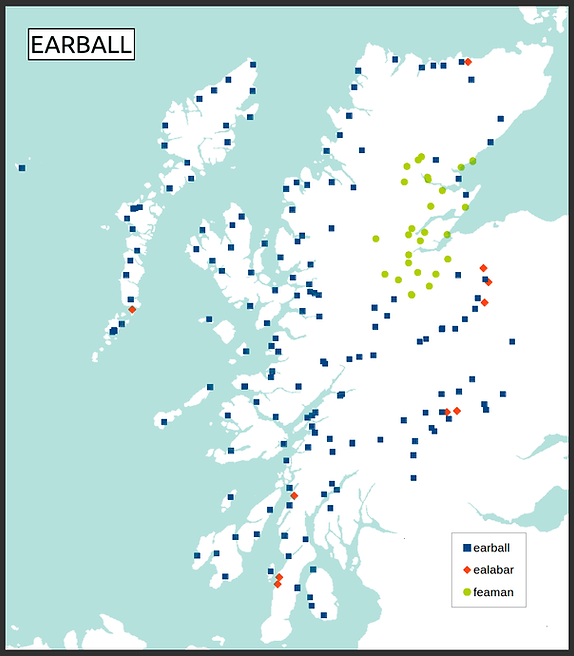Spelling Variations
Metatheseis, the interchanging of consonants in a word, is a feature commonly found in languages e.g. in Scots, e.g. 'brunt' in place of 'burned' or 'waps' can be heard meaning 'wasp' - though in Old English, 'wæps' was used. English has many examples of metathesis e.g. 'thirteen' instead of 'thriteen' and the process continues to the present day - e.g. American 'purty' for pretty'.
Imlich' is an example in the Gaelic language. It can be seen that 'imlich' was found in Kintyre, Perthshire and on the islands, with some exceptions on Lewis while northwards from Strath Spey, with the exception of eastern Sutherland and Easter Ross, the 'Ilmich' version is found .
In the case of 'muinchill', there are two main variations with, on the second map opposite, 'mun' representing the above spelling while 'mul' represents 'muilchinn'. Results from the Survey show that the version where the letters have been exchanged was far more common in the Gaelic speaking Highlands of the mid 20th century than the standard word, this latter being confined to Lewis and parts of the eastern Highlands e.g. Perthshire and Speyside. Both 'muinchill' and 'muilchinn' are given in Dwelly's dictionary.
Another example in Gaelic is seen, though to a much smaller extent, in 'earball' (tail), where 'ealbar' is used. It is difficult to discern a pattern with this variation except that the few cases are found at the margin of the Gaelic speaking area of the time.
The preferred use of 'feaman', rather than 'earball', for 'tail' is restricted to the Inverness area, south-east Sutherland and Easter Ross, though in most cases the Survey shows that 'earball' was also used in these areas.



Move the cursor onto the map to see the second word: click and hold to see the third word